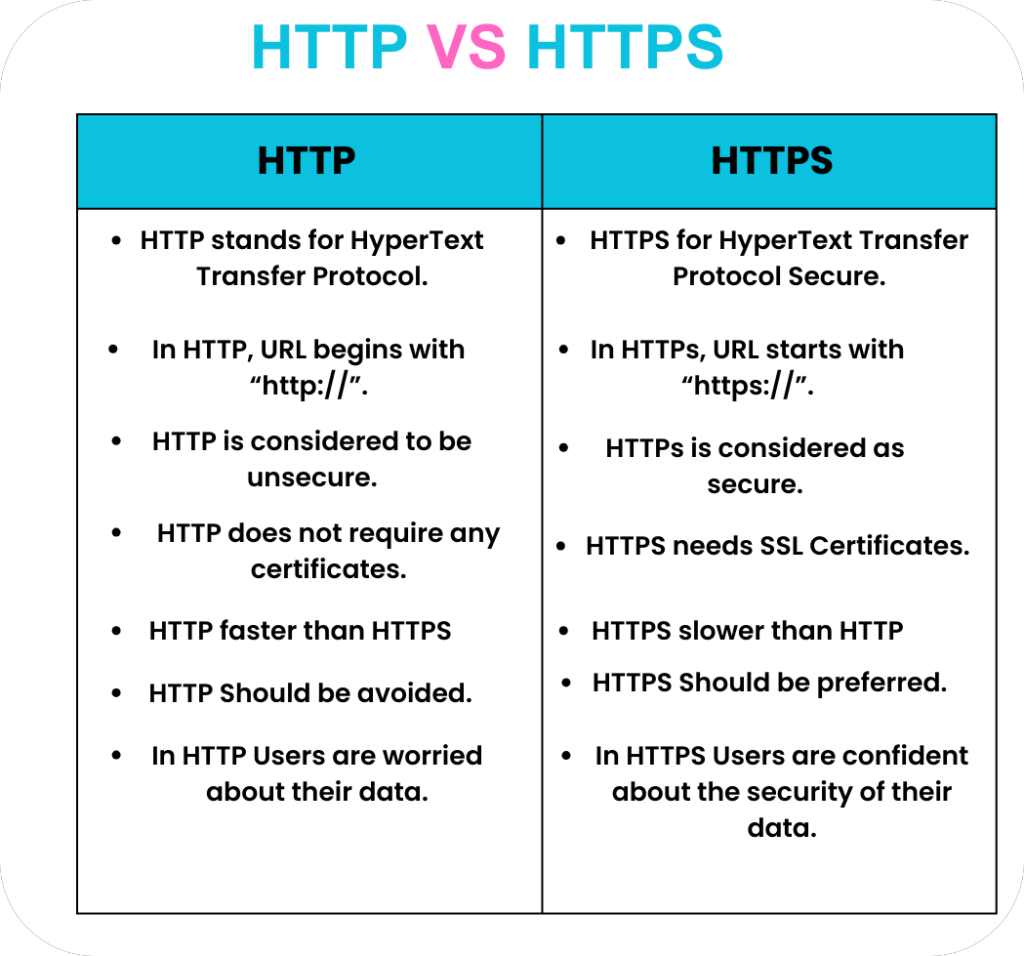HTTP VS HTTPS :
HTTP (Hypertext Transfer Protocol) and HTTPS (Hypertext Transfer Protocol Secure) are both protocols used for transferring data between a client (such as a web browser) and a server over the internet. The main difference between them lies in the level of security they provide:
- Security: HTTPS is secure because it encrypts the data being transmitted between the client and the server using SSL/TLS (Secure Sockets Layer/Transport Layer Security) encryption. This encryption prevents unauthorized access to the data, making it much harder for attackers to intercept and read sensitive information such as passwords, credit card numbers, and personal details. On the other hand, HTTP does not provide encryption, so the data being transmitted is sent in plaintext, making it vulnerable to interception and manipulation by malicious actors.
- Authentication: HTTPS also provides authentication, which ensures that the client is communicating with the intended server and not an imposter. This is done through digital certificates issued by trusted Certificate Authorities (CAs). These certificates verify the identity of the website, giving users confidence that they are connecting to a legitimate and secure server. HTTP does not provide this level of authentication, leaving users susceptible to phishing attacks and man-in-the-middle attacks where an attacker intercepts communication between the client and server.
- Protocol: Both HTTP and HTTPS use the same underlying protocol for communication, which is the HTTP protocol. However, HTTPS adds an extra layer of security through SSL/TLS encryption.

ADVANTAGES AND DISADVANTAGES OF HTTPS :
Advantages of HTTPS:
- Data Encryption: HTTPS encrypts data transmitted between the client (such as a web browser) and the server, ensuring that sensitive information remains secure and cannot be easily intercepted by hackers.
- Authentication: HTTPS provides authentication through digital certificates issued by trusted Certificate Authorities (CAs), verifying the identity of the website and ensuring that users are connecting to a legitimate server.
- Trust and Credibility: Websites using HTTPS demonstrate a commitment to security and protecting user privacy, instilling trust in visitors and encouraging them to engage more confidently with the site.
- SEO Benefits: HTTPS websites may receive preferential treatment in search engine rankings, as search engines like Google consider them more secure and trustworthy.
- Compliance with Security Standards: HTTPS is often required to comply with various security standards and regulations, especially for websites handling sensitive information such as financial transactions or personal health data.
- Protection against Data Tampering: HTTPS protects against data tampering during transit, reducing the risk of unauthorized modification or tampering with sensitive information.
- Enhanced Privacy: HTTPS encrypts users’ browsing activities, preventing ISPs and other third parties from monitoring or tracking their online behavior, thereby enhancing privacy and confidentiality.
Disadvantages of HTTPS:
- Performance Overhead: HTTPS encryption and decryption processes can impose a slight performance overhead on the server and client, leading to slightly longer page load times compared to HTTP.
- Cost: Acquiring and renewing SSL/TLS certificates from trusted Certificate Authorities can incur costs, especially for organizations managing multiple domains or subdomains.
- Setup Complexity: Configuring HTTPS on a server and ensuring compatibility across different devices and browsers can be more complex compared to HTTP setup.
- Caching Challenges: HTTPS can present challenges with caching content, as encrypted data is less cacheable than plaintext HTTP data, potentially affecting website performance.
- Mixed Content Issues: Mixing HTTP and HTTPS content on a single web page can lead to security warnings and compatibility issues, requiring careful management and configuration.
- Initial Setup Time: Setting up HTTPS for the first time may require additional time and effort, including obtaining and configuring SSL/TLS certificates and updating website links and resources to use HTTPS.
- Compatibility Concerns: Some older devices or outdated browsers may have compatibility issues with HTTPS, potentially affecting user experience for a small subset of visitors.

ADVANTAGES AND DISADVANTAGES OF HTTP :
Advantages of HTTP:
- Simplicity: HTTP is straightforward and easy to implement, making it accessible for developers to set up and work with.
- Performance: Compared to HTTPS, HTTP typically has lower overhead because it doesn’t involve encryption and decryption processes, potentially resulting in faster page load times.
- Caching Efficiency: HTTP allows for efficient caching of web content, as resources transmitted over HTTP are often cached by web browsers and intermediate proxy servers, improving website performance and reducing bandwidth usage.
- Compatibility: HTTP is widely supported by various devices, browsers, and web servers, ensuring compatibility across different platforms and environments.
- Lower Cost: Since HTTP does not involve the acquisition and management of SSL/TLS certificates, it may be less costly to implement and maintain compared to HTTPS, especially for smaller websites or applications.
Disadvantages of HTTP:
- Lack of Security: One of the most significant drawbacks of HTTP is its lack of encryption, making data transmitted over HTTP vulnerable to interception and eavesdropping by malicious actors. This poses a serious security risk, especially for websites handling sensitive information such as login credentials or financial details.
- No Authentication: HTTP does not provide authentication mechanisms, meaning there is no way to verify the identity of the website or server, making users susceptible to phishing attacks and man-in-the-middle attacks.
- Privacy Concerns: Without encryption, HTTP exposes users’ browsing activities to potential surveillance by ISPs and other third parties, compromising privacy and confidentiality.
- Regulatory Compliance Issues: Depending on the nature of the website or application, using HTTP may not meet regulatory requirements for data protection and security, potentially leading to legal and compliance issues.
- SEO Disadvantages: Search engines like Google may prioritize HTTPS websites over HTTP sites in search rankings, potentially impacting the visibility and discoverability of HTTP-only websites.
- Limited Trust: Users may perceive HTTP websites as less trustworthy compared to HTTPS sites, especially when entering sensitive information or making online transactions.
- Browser Warnings: Modern web browsers often display warnings when users visit HTTP websites, alerting them that the connection is not secure. These warnings can deter users from accessing the site and undermine trust in its security.
